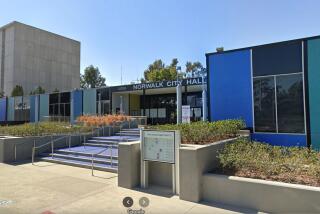Housing for Disabled, Ill Under Fire in San Pedro
Los Angeles City Councilman Rudy Svorinich Jr. said Friday that he will press for a controversial moratorium on additional “special needs housing” in San Pedro, despite legal advice that such a measure probably could not withstand a court challenge.
“It will be difficult but not impossible” to draft a moratorium that does not run afoul of state and federal anti-discrimination laws, Svorinich acknowledged in an interview.
He also will ask that the city attorney draft a less restrictive “interim control ordinance” that could be enacted quickly “in case the moratorium does not withstand judicial scrutiny.” Either measure would “buy time” for efforts to amend state and federal fair housing statutes to give cities and counties more say in zoning and siting matters, he said.
Svorinich’s remarks came the day after he chaired a spirited City Council committee meeting in the port community’s Peck Park Recreation Center auditorium. Drawing about 500 people and lasting 4 1/2 hours, the sometimes-tense session was the latest round in a debate launched more than a year ago by an organization of property owners and merchants. The organization says a “proliferation” of housing for the disadvantaged is spoiling once-peaceful residential neighborhoods and delaying revitalization of the quaint but struggling “old downtown” district.
But critics of the organization, Community Advocates for Responsible Environmental Safety, say the group is wrongly blaming social service agencies and their clients for economic problems spawned by the loss of some 25,000 military and maritime jobs in recent years. They say the group’s push for a moratorium on special needs housing--including group residences for the elderly, the mentally ill, the disabled, homeless families and recovering alcoholics and drug addicts--is dividing the community and threatening badly needed services.
Deputy City Atty. Jess Gonzales said a sweeping moratorium, such as the two-year, San Pedro-wide one proposed in a recent report on special needs housing, would almost certainly be overturned by the courts as discriminatory.
“You must treat everyone equally,” Gonzalez said. And, he added, the court would not look upon a backup “interim control ordinance” as different from a moratorium.
Any measure aimed at even temporarily thwarting housing for disadvantaged groups protected by statutes and the Constitution would run into trouble in the courts, Gonzalez said.
Officials in Long Beach and Hartford, Conn., the two cities that the property owners group cites as models for a moratorium, are expecting legal challenges, Gonzalez said.
Long Beach is probably on slightly firmer ground than Los Angeles would be because the smaller city has been undergoing dramatic changes in zoning and planning in its downtown areas, Gonzalez said. Svorinich said he believes the impending review of San Pedro’s community plan would give San Pedro a similar basis for a moratorium.
Svorinich said he plans to appoint a 10-member advisory committee to help draft a moratorium, with half the members coming from the property owners group and half from the Harbor Area Collaborative, a coalition of social services agencies, labor and religious leaders that opposes a moratorium.
Several city officials and community speakers Thursday night said that more diligent enforcement of measures already on the books could bring relief to neighbors of “problem” group homes. Cracking down on noise, loitering, building and health and safety violations, they said, would resolve many of the problems. A moratorium would hit primarily the licensed, already heavily regulated agencies near downtown but do nothing to stop the smaller “sober living homes” that do not require licenses or other government permits, they said.
Contrary to beliefs expressed at the meeting, Gonzalez said citizens cannot be sued by the operators of group homes for registering legitimate complaints.
More to Read
Sign up for Essential California
The most important California stories and recommendations in your inbox every morning.
You may occasionally receive promotional content from the Los Angeles Times.







